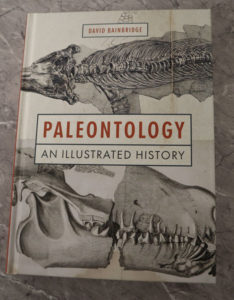Explaining Some Terms in Palaeontology and Providing Helpful Advice
Paleontology versus Palaeontology
When Everything Dinosaur team members are working in schools delivering workshops about evolution, fossils and dinosaurs we are happy to advise and assist teaching teams where we can. Although we send out lots of free teaching resources, lesson plans, activity ideas and extensions, we do see a lot of other teaching materials, some of which have been downloaded from educational company websites, that are inaccurate. Some of these teaching resources are purchased, sadly, teachers might be unwittingly misleading students as well as wasting the precious school budget.
Teaching about Palaeontology
Our team members try to help where we can. For instance, whilst working with a Key Stage 3 class we were asked to explain how come the word palaeontologist can have two different spellings.
Palaeontology – It is Global!

The front cover of “Palaeontology an Illustrated History” by David Bainbridge a comparative anatomist in the Department of Physiology, Development and Neuroscience at the University of Cambridge. The book has used the American spelling of the word “paleontology”.
The term “paleontology”, note the second “a” is missing is the American form of the term palaeontology. We at Everything Dinosaur tend to use the non-Americanised version of the word to describe the study of ancient creatures and their fossils.
Helpful Terms and Explanations
Palaeontology (UK) Paleontology (USA) – The study of extinct organisms and their fossils.
Palaeontologist (UK) Paleontologist (USA) – A person who studies extinct organisms and their fossils.
Vertebrate Palaeontologist (UK) Vertebrate Paleontologist (USA) – The branch of palaeontology that studies animals with back bones.
Invertebrate Palaeontologist (UK) Invertebrate Paleontologist (USA) – The branch of palaeontology that studies animals without back bones.
Micropalaeontology (UK) Micropaleontology (USA) – The study of microscopic fossils (micro-fossils).
Palaeobotany (UK) Paleobotany (USA) – fossil plants; traditionally includes the study of fossil algae and fungi in addition to land plants.
Human Palaeontology (UK) Human Paleontology (USA) – The study of prehistoric human and proto-human fossils.
Palaeoanthropology (UK) Paleoanthropology (USA) – As above (prehistoric human and proto-human fossils).
Palaeoecology (UK) Paleoecology (USA) – Ecology of extinct and prehistoric organisms.
Palaeoclimatology (UK) Paleoclimatology (USA) – The study of past climates.
Palaeogeography (UK) Paleogeography (USA) – Study of geographical features of the past.
Palaeomagnetism (UK) Paleomagnetism (USA) – Study of the magnetism remaining in rocks and related magnetic fields.
Credit: Everything Dinosaur
Visit Everything Dinosaur’s website to view replicas of iconic prehistoric animal fossils and other educational products: Educational Products and Replicas of Iconic Fossil Animals.


